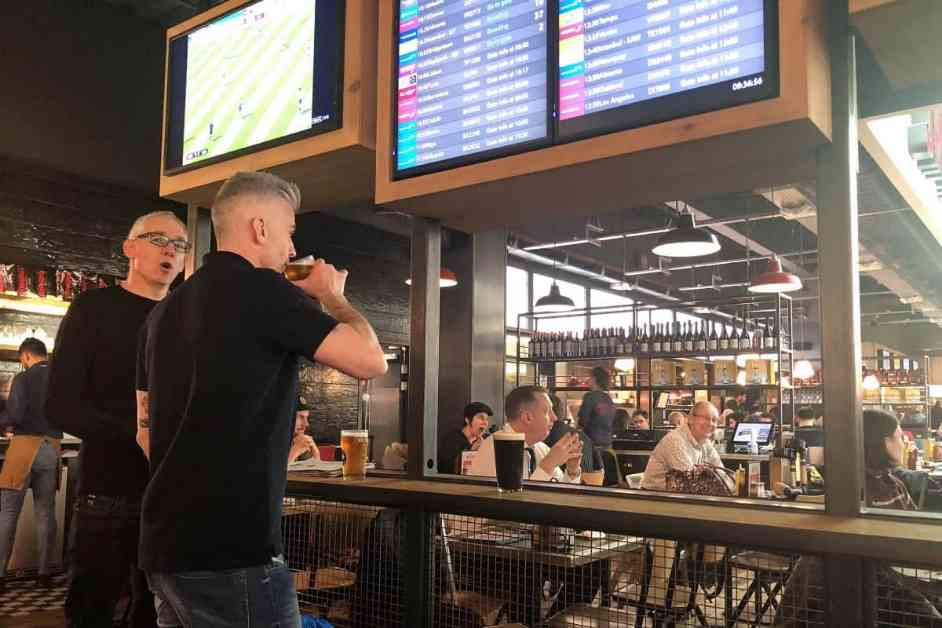Implementing ‘Two-Drink Limit’ Rule at Airports Urged for Passenger Safety
In a recent call for action, Ryanair chief executive Michael O’Leary has raised concerns about the increasing incidents of disorder on flights, urging for the implementation of alcohol limits in airports. According to Mr. O’Leary, passengers should be restricted to two drinks per journey to address what he perceives as a rise in antisocial behavior and violence on flights. The issue of inebriated passengers causing disturbances in the air has become a growing concern for airlines and aviation authorities alike.
The Need for Alcohol Limits
Mr. O’Leary highlighted the need for stricter regulations regarding alcohol consumption in airports, emphasizing the potential dangers of allowing unlimited access to alcohol before flights. He expressed his concerns about the prevalence of violent outbursts occurring on a weekly basis, often fueled by excessive drinking. The combination of alcohol with other substances has been cited as a major factor contributing to the escalation of antisocial behavior onboard aircraft.
“We don’t want to begrudge people having a drink. But we don’t allow people to drink-drive, yet we keep putting them up in aircraft at 33,000 feet,” Mr. O’Leary stated. He emphasized the challenges faced by airlines in identifying inebriated passengers at the gate, especially when boarding in groups. Despite efforts to monitor passenger behavior, individuals who appear to be under the influence of alcohol can often slip through security checks, only to cause disruptions once the plane is airborne.
Challenges Faced by Airlines
Crew members and other passengers have increasingly become targets of unruly behavior, with delays exacerbating the problem by providing passengers with more time to consume alcohol at airports. Mr. O’Leary highlighted the shift in behavior among intoxicated passengers, noting that in the past, individuals who had consumed excessive amounts of alcohol would eventually pass out or fall asleep. However, with the prevalence of drugs and other substances in addition to alcohol, passengers are exhibiting more aggressive and unpredictable behavior, posing challenges for airline staff to manage.
“It’s the mix. You get much more aggressive behavior that becomes very difficult to manage,” Mr. O’Leary explained. The rise in incidents of disruptive behavior onboard flights has prompted airlines to reassess their policies regarding alcohol consumption and passenger conduct. In an effort to curb unruly behavior, some airlines have resorted to stricter security measures, such as conducting bag searches before passengers are allowed to board, particularly on flights to popular “party destinations” like Ibiza and certain Greek islands.
Impact on Passenger Safety
The issue of inebriated passengers causing disturbances on flights extends beyond mere inconvenience, posing serious threats to passenger safety and overall flight operations. Incidents of violence and disruptive behavior can not only disrupt the peace and comfort of other passengers but also jeopardize the safety and security of the entire flight. Crew members are often tasked with managing and de-escalating situations involving unruly passengers, putting their own safety at risk in the process.
Moreover, the presence of intoxicated individuals onboard flights can create a hostile and uncomfortable environment for all passengers, leading to increased anxiety and stress among travelers. The potential for conflicts to escalate into more serious incidents poses a significant risk to the overall wellbeing of passengers and crew members alike. In light of these concerns, the need for stricter regulations and enforcement of alcohol limits in airports has become a pressing issue for the aviation industry.
In conclusion, the implementation of a ‘two-drink limit’ rule at airports has been proposed as a measure to address the rising incidents of disorder and violence on flights. By restricting passengers to a limited number of drinks per journey, airlines aim to mitigate the risks associated with excessive alcohol consumption and its impact on in-flight behavior. The safety and security of passengers and crew members must remain a top priority, and proactive steps must be taken to ensure a safe and comfortable travel experience for all individuals onboard flights.





















